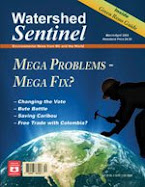After the recent provincial elections we had in BC, I am afraid we are really heading towards major problems of unsustainability. The Liberal party was re-elected, their main goal is keep the unlimited economic growing. No matter what.
Since the term sustainable development was coined more than 30 years ago, our culture has become anything but sustainable. It seems like on purpose we have gone exactly in the opposite way. I have said before that we, as a culture, have failed to understand and to practice sustainability. This term was coined in the 1987 Our Common Future report as “development that meets the needs of the present without compromising the ability of future generations to meet their own needs.”
I think the fundamental mistake was we misread needs for wants. The situation in BC, and mainly with the Liberal party, is exactly the same as with their unlimited economic growth mantra. This is a recipe for systemic failure; its unavoidable consequences are resource depletion, production of waste, pollution, ecological collapse, climate change; it is destroying many BC ecosystems and it is making the whole province highly vulnerable.
Sustainable economic growth is an oxymoron. It implies maintaining the same growth, without change. Something that is entirely impossible. In a sense, it seems we humans fear change, without realizing that life itself is a continuous change, but we choose to pursue an impossible static state. Life and all ecosystems are in a endless adapting cycle: growth, collapse (change), adaptation, renovation and back to growth.
This is where Resilience enters. Resilience accepts that change is a given. Resilience is about continuous renewal: in our behaviours, in our homes, in our communities. Resilience is about being able to understand and adapt to the never ending changing cycles of life. Everything is always changing: the food, water, forests, air, climate systems.
For instance, because of the changes in climate, food systems are facing constant changes through droughts, floods, disease. Having a resilient food system will include growing diverse local food, supporting our local growers, adjusting our diet for seasonal, local foods.
Similar situation exists to have a resilient water system. In the case of island communities, first of all, we need to know how much groundwater we have; we need to plan for collecting rainwater; we need to set gray water treatment systems; we need to ensure our wells are protected against saltwater intrusion. At the same time, we need to evaluate the level of vulnerability from coastal hazards like sea level rising, storms, coastal erosion and more.
A few characteristics of a resilient water system would be:
Diversity. We need different systems. We should not rely on a single source for freshwater. A single system is a point of failure and makes us very vulnerable.
Redundancy. Besides diversity, it is necessary to have backup systems. For instance if we are only depending on groundwater, when our wells go dry, or when we have a major power failure, we are out of luck.
Decentralization. One central system is vulnerable for failure and it affects everyone depending on that system. A system with multiple, diverse, sources of freshwater is much more resilient.
Transparency. Do not make our systems a secret. Transparency will make it easier to find out where a problem may lie. Sharing our plans makes an open system.
Flexibility. Be ready to change the system when things are not working the way we expected. All systems should be nimble, easy to repair, and to improve.
Foresight. We cannot predict the future. But we can see the signs when a system may have problems. It is required to have good problem determination procedures to facilitate repairs.
In our current times of so many rapid changes, to our social systems, our ecological systems and our economic systems, resilience will help us to deal with these changes, to adjust to them, and in many cases, even to learn and co-evolve with them.
We need to accept that unlimited economic growth will only make things worse, much worse. We need to think, and practice, resilience.
-


